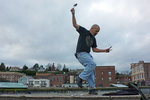A look at the history of spoons might reveal notions of service or hospitality. Spoons evoke giving; and in the right hands, they can really bang out a rhythm.
Artis the Spoonman, player of …
This item is available in full to subscribers.
We have recently launched a new and improved website. To continue reading, you will need to either log into your subscriber account, or purchase a new subscription.
If you had an active account on our previous website, then you have an account here. Simply reset your password to regain access to your account.
If you did not have an account on our previous website, but are a current print subscriber, click here to set up your website account.
Otherwise, click here to view your options for subscribing.
* Having trouble? Call our circulation department at 360-385-2900, or email our support.
Please log in to continue |
|





A look at the history of spoons might reveal notions of service or hospitality. Spoons evoke giving; and in the right hands, they can really bang out a rhythm.
Artis the Spoonman, player of spoons, is performing in a show called "Artis the Spoonman Experience" Feb. 27 and 28 at Key City Public Theatre. A music-maker extraordinaire, Artis is happens to be one of the kindest folks you're likely to meet, as well as one of Port Townsend's more famous denizens. Pete Seeger called him "the best spoon player in the whole damn universe;" and when Artis played with the Grateful Dead, drummer Mickey Hart reportedly said, "finally, some real music."
Directed by Ahmad Baabahar, the Artis the Spoonman Experience begins with a retrospective of Artis's work, wherein Artis is accompanied by Tomoki Sage on drums, Baabahar on steel resonator guitar and Walter Harris on bass.
The second set each night is Artis' own show and material.
"I really want the show to be an experience for people, to have a moment in time with [Artis]," Baabahar said. "The show is about his history."
Artis, who moved to Port Townsend in 2009, has been playing the spoons for more than 50 years, performing on national television, in hospitals, in lounges, at street fairs and on sidewalks up and down the West Coast since the 1970s. A master of his craft, he's recorded with Frank Zappa and Soundgarden, and performed with Aerosmith, Ramblin' Jack Elliot, Utah Phillips, Pete Seeger, k.d.lang, Itzhak Perlman, the Seattle Philharmonic Orchestra, Ani DiFranco, Phish, String Cheese Incident, Pele Juju and Jim Page, to name just a few. He also played with the Flying Karamazov Brothers.
He's appeared on Broadway shows, in BBC and PBS television shows, on the David Letterman Show and more.
Baabahar recalls the first time he saw Artis, in the 1990s. Artis was performing in front of "20 or 30,000 people" at the Bumberdrum at Seattle's Bumbershoot Festival, "back when [Bumbershoot] was still $5." After that, "I started to see him around town, playing with Jim Page" and others. "I was like, 'this guy's a master.'"
In 1994, Seattle band Soundgarden wrote a grammy-winning song about Artis called "Spoonman."
"[Soundgarden] saw what I saw," said Baabahar, "and they made a hit with it." That's big praise, Baabahar said, "when you see people like Zappa or Soundgarden who at the top of their game are saying 'I want to play with this guy.'"
Artis has performed every year for more than 25 years at the Oregon Country Fair. He busked at the Pike Place Market for years. He still sometimes plays on the sidewalk in downtown Port Townsend, and regularly plays at Jefferson Mental Health on Fridays, and at the PT Food Bank on Wednesdays, recently with his brother, Crow, accompanying him on mandolin. "I'm serious, man, it fit, it was good," Artis said.
THE SPOONS
He used to carry them in his pocket, but now keeps his spoons in a fanny-pack he calls his "emergency kit." When he plays, he spreads extra spoons on a blanket at his feet. Holding spoons in his muscular hands, he performs a dance of percussion, slapping his thigh, torso, arms and even his face, throwing his head back and bending forward, squatting and standing, windmilling his arms, making music.
Sometimes he holds them between his fingers so both ends click together, or lets them "fall" a little to make a special sound; sometimes the spoons have tape wrapped around the handle; sometimes they're are rubber-banded back-to-back around a small block of wood.
He has metal, wood and plastic ones. He even has some electric spoons. He used to give out those small, flat Dixie-cup spoons as calling cards.
"They don't make spoons like they used to," he said. It's getting harder for him to find high-quality ones to play. In his kit is a big plastic one someone made for him, and flat round-edged wooden rectangles.
He also plays nose flute, sometimes two flutes at once, and does string figures, "cats' whiskers and teepees and stuff."
Artis is a consummate entertainer.
"I don't particularly like playing unless somebody likes it," he said. "Music animates me. But what animates me the most is kids."
If a family walks by him playing on the street and a kid wants to touch the spoons, pick some up and try to play them, Artis is all for it.
"If they're really trying, I'll put them together with a block of wood," he said. He recalled a time "a 7-year-old came and picked up two spoons, and I'll be damned if he didn't hold them back to back and play it. Whatever he did, it was going on. Just to pat my own back, I gave him a pair."
FROM THE 1970s
He started playing for kids at the Seattle Children's Hospital in the '70s, performing and then teaching. He'd go from room to room, playing for three or four kids at a time; one little girl, he said, was indifferent when he first played for her. Then they brought all the kids together in a waiting room.
"When I play, I go around and play people's hands," he said, and he went to her first – then saw that her hand was deformed, missing some digits. At the end of the show, he gave her two small spoons to try.
"She picked it up like that," he said. "Like she'd been doing it all her life."
Making music with minimal equipment, sticks or spoons or whatever's laying around, or just with clapping and snapping and slapping, is fun and free and everyone can do it.
"Music is kind of like magic," Baabahar said. "Once it's there, it's gone. It is this moment, this experience."
"If you can tap your toes ... you can make music," Artis said. "You can make music with anything." If the spoons are too noisy, kids can put tape on the ends to mute the sound, he said.
SPOON START
How did Artis get started with the spoons?
When he was about 10, his mom gave him and his sister each a pair of musical spoons, the kind that are connected with a plastic handle.
He broke his, took his sister's and never gave them back.
They were made by Walt Haines, who had a cottage industry funded by Lawrence Welk. (Artis loves Lawrence Welk. "Nobody better diss Lawrence Welk," he said. "He got octogenarians off their butt" dancing.)
Many, many years after he broke that first pair of spoons, Artis was on the street busking and a woman asked him if he'd ever played the kind of spoons with handles. She turned out to be Haines' daughter. "Bless her heart, she gave me a prototype," a wooden version of the original connected musical spoons.
Another early influence was seeing some Cossack squat-dancers on the Ed Sullivan Show, doing the drop kick and playing spoons in each hand "hambone style," slapping thighs and chest. "If you really want to get out, play with both hands," Artis said.
In 1972, while living in Seattle's Fremont neighborhood, he began playing teaspoons along with the jukebox at the Fremont Tavern and the Too-High Tavern. People started coming to see him. "I just played along with the jukebox," he said.
Around 1974, someone showed him a move involving playing spoons all the way up the side of his body, to his face.
That was the period when he started making a living with his art, playing his rhythms on the street, busking and "chasing the Spoonman," he said. He did so for decades.
"I've never done it for the money," he said. "Dammit, dammit, dammit."
Advice for buskers: "Do not use it for practicing. Do not use it for rehearsals. And don't expect any money. If you only get a dollar bill and a dime for the whole day's work, that's two tips.
"I've had a $2,000 tip. And I've had a dollar and a dime.
"You don't go out there for money. Allow yourself to receive money, but if you're gonna go out there on the sidewalk [to earn money], go sell something or get a job.
"Do you want to succeed at your gain, or do you want to succeed as an entertainer? Do you want someone to come back two years later and tell you you changed their life by banging some spoons on the sidewalk?"
Artis was on the Gong Show once. His performance "sucked," he said, because "I wasn't playing for anybody, I was competing."
He recalls the panel asking, "'are you worth a million dollars?'" and himself replying, "Oh, without a thought! Everyone's worth a million dollars."
Baabahar interjected, speaking for Artis: "I dunno if I'm worth a million dollars, but I know Zappa thought I was worth playing with."
"What I would have said is there isn't a pitch anywhere – Carnegie Hall or David Letterman – a more challenging or more rewarding stage as the sidewalk," Artis said. "As Venice Beach."
SPOONMAN SHOW
You don't have to wait for Venice Beach. The Spoonman Experience begins at 7 p.m., Friday and Saturday, Feb. 27 and 28 at Key City Public Theatre, 419 Washington St., Port Townsend.
"Between you and me and the rest of the world – I’m scared to death," Artis admitted. "I have been practicing two-plus hours a day. Never practiced before, in 55-plus years of playing."
Tickets to the Spoonman Experience, $15, support Artis the Spoonman’s Soup Spoon Fund, which provides funds for individuals committed to completing dual diagnosis addiction treatment. Dual diagnosis is a term used to describe people with mental illness who have coexisting problems with substance abuse.
With "exceptional help" from Lisa Stoddart, the Soup Spoon Fund received its 501(c)(3) nonprofit registration in November 2014. See soupspoonfund.org.
Artis also is featured on KPTZ 91.9 FM radio's "Tossed Salad" with host Phil Andrus at 1 p.m., Friday, Feb. 27. "Soup and salad," Artis quipped.
One of the most significant events in his own life, Artis said, was becoming sober.
"I did 45 years of alcohol, and a few sidesteps to other drugs," he said.
When he turned 60, he said, he "deflated. Quit, in a fashion," performing. But he couldn't stay away from the spoons for long.
"So I got back into it," he said. "You never know who's listening."
Regularly, he said, "somebody says, 'I've been watching you and you did something that changed my life.'" He recalled a woman approaching him at Aldrich's Market in Uptown Port Townsend and telling him she'd gone home and quit her job and begun training as a dancer. Another person "came up to me and said, 'you know, I saw that show, Artis, and I quit what I was doing.'"
That's why Artis performs.
"Tenacity, ambition and ego only takes you so far," he said. "It's about those moments when you give something."